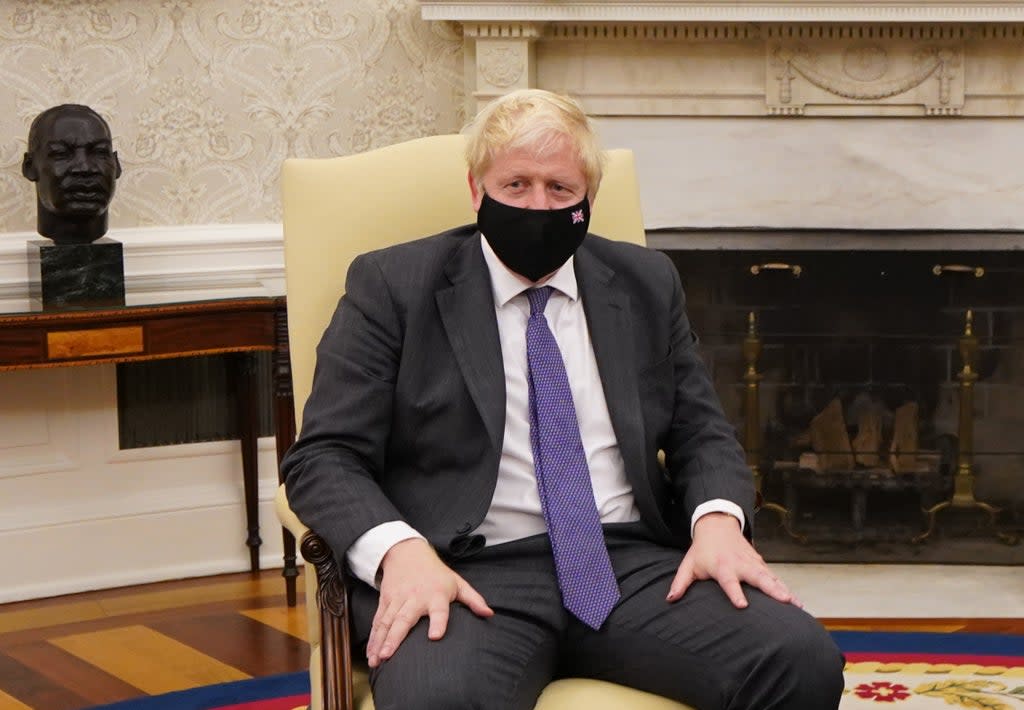It is time for Boris Johnson to get a grip on rising energy prices

- Oops!Something went wrong.Please try again later.
- Oops!Something went wrong.Please try again later.
Welcome back, prime minister. It is time for you to prenez un grip. Boris Johnson returns from lecturing the world’s representatives at the United Nations in New York about the climate emergency to find that a lot of other things are going wrong at once.
Many of them, ironically, are the result of global forces that he could have been discussing with other world leaders. Having told the UN general assembly how “easy” it is to wean the world off carbon, he returns home to demands that he do something about high fuel prices so that the UK can continue to burn more fossil fuels.
The rise in natural gas prices is the result of the world economy rebounding more sharply than expected from the effects of Covid-19, and that bounce back has had dramatic effects throughout the economy. The latest development is that some BP and Esso petrol stations are having to close because of the shortage of lorry drivers.
This week Kwasi Kwarteng, the business secretary, was at weary pains to protest that, no, Britain was not sliding back to the industrial chaos of the three-day week in the 1970s. And yet every headline since then has only added to the impression of the return of the bad old economic days.
The sharp rise in natural gas prices is not yet comparable to the oil price rises of the 1970s, but many of the disruptions could be similar if on a smaller scale – and the longer the rise in the price of gas lasts the larger the scale. It was notable that just in the last 24 hours ministers have become less confident that the price rise is a temporary phenomenon.
That means the spectre that haunted the economic history of the 1970s has returned. Inflation was expected to go above 4 per cent by the end of this year, and now the Bank of England has said that it expects it to stay that high for the first half of next year.
This will add to the cost of living, already being pushed up for many families by the cut in universal credit and for most families by the tax rises planned for next year. The rise in energy bills is now the most dramatic and politically threatening form of inflation, and it is here that Mr Johnson needs above all to get a grip of the situation.
There are some signs that the government is preparing to act in next month’s Budget. It has been reported, for example, that ministers are discussing a small increase in universal credit to offset the end of the £20-a-week uplift, while trying to preserve work incentives.
But the prime minister and the chancellor, Rishi Sunak, need to take immediate action to reassure people about rising energy bills. So far, ministers have insisted that the price cap on energy bills will stay, but that does not protect many customers from being moved off cheaper tariffs to more expensive ones, nor does it reassure the customers of energy companies that have gone bust or that are at risk of doing so.
Just when the Treasury might have thought that the demands for exceptional spending to support people through the pandemic were coming to an end, it may be that further public spending will be needed. It is just as well that the strength of the recovery in the UK, as in most of the world, is such that Mr Sunak has more room for manoeuvre in his 27 October Budget than he expected. He has already had to bail out CF Industries, the carbon dioxide maker. That could be just the start of protecting people on low to middle incomes this winter.
Read More
Reshuffle in full: Who is out and who has been promoted?
Boris Johnson flexes muscles with cabinet shake-up for post-Covid era
PM won’t say how Universal Credit claimants can recoup lost £20-a-week

